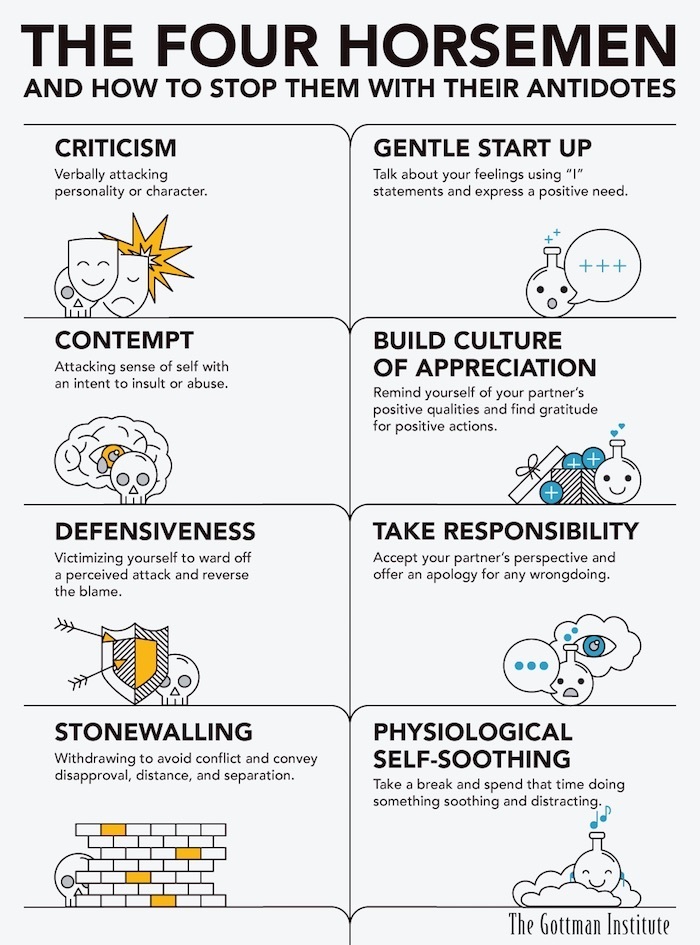No one knows how to handle different types of conflict better than the founders of The Gottman Institute, Julie Schwartz Gottman, PhD, and her husband and collaborator John M. Gottman, PhD. The psychologists are skilled at providing insightful advice to others, having spent decades studying thousands of relationships and types of couple arguing. They have a deep, vast understanding about the type of conflict solutions that work—and what doesn't. Instead of one universal "here's what to do when confronted with conflict" rule to follow, the Gottmans say its important to fist identify the four types of conflict (commonly referred to as The Four Horsemen).

While most commonly used for conflicts in romantic relationships, identifying the types of conflict you're confronted with and acting accordingly actually works regardless of who you're disagreeing with, whether it's a friend, colleague, or your mom.
The 4 types of conflict
1. Criticism
Hot tip: Straight up telling someone what it is about their personality that's grating on you isn't going to lead to anything positive (or productive).
Instead of saying something like, "You're so self-centered. Of course you forgot my birthday," they suggest expressing how you feel using "I" statements. For example: "It makes me feel like you don't value our relationship because you forgot my birthday." This opens the door up for a more constructive conversation rather than the other route, which is only going to have both parties on the defensive.
2. contempt
It's human nature to fall short of expectations. The trick to get someone to level up, according to the Gottmans is explaining why you appreciate them before asking them to do something.

{{post.sponsorText}}
Say you have a roommate who isn't as tidy as you are and always leaves her stuff in your shared space. Instead of calling her a slob (seriously, don't), say: "Hey, I know how busy you are and your job is crazy right now, but I'd appreciate it so much if you could just make sure the living room is clean." She still might not like to hear it, but at least it won't lead to World War III.
3. defensiveness
Feel like a victim? The urge to go on the defensive happens when you're confronted with a negative consequence and you don't feel like it's your fault. Maybe the problem is that your fridge is completely bare (why do you have to be the one to do the food shopping all the time) or there was an overdraft in your account and you feel your partner's spending habits are to blame, not yours. Regardless of how you got there, now you're both in some hot water—and you're boiling.
As tempting as it may be to pin all the responsibility on the other person, the Gottmans' advice is to share the blame and work together toward a solution. Yes, it's easier said than done, but saying, "We're out of food again. Let's figure out a way where we can both make sure the fridge is full" is going to be way more productive than saying it's all the other person's fault.
4. stonewalling
Sometimes when confronted with conflict, the urge is to just not deal with it at all, by avoiding someone or giving them the silent treatment. If the relationship is important to you, the truth is that you're going to have to deal with the conflict sooner or later. Take a time out, do something that actually makes you happy, and then revisit the conversation calmly. The go-to phrase to keep in your back pocket: "I definitely want to discuss this with you, but I feel overwhelmed right now. Can we talk about it in an hour?"
Conflict is never fun, but it happens. But with the Gottmans' advice (and the trusty Four Horseman) it doesn't have to ruin your day—or your relationships.
These are the four relationship rules a marriage counselor follows. And these are the most common relationship problems—and how to solve them.
Loading More Posts...